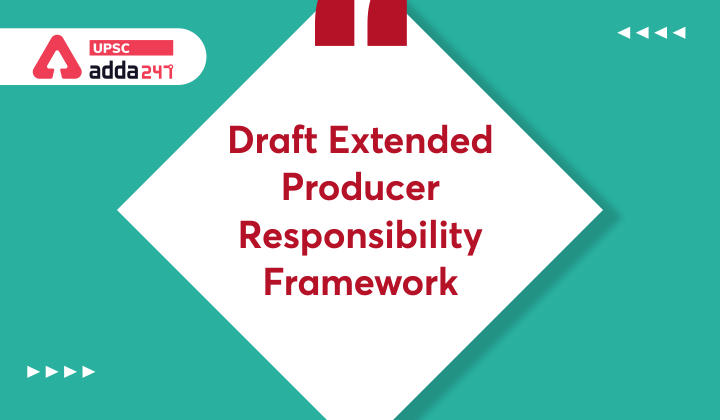Table of Contents
Draft Extended Producer Responsibility Framework: Relevance
- GS 3: Conservation, environmental pollution and degradation, environmental impact assessment.
Draft Extended Producer Responsibility Framework: Context
- Recently, Ministry of Environment and Climate Change has issued draft rules for the regulation of extended producer responsibility under plastic waste management rules 2016
Draft Extended Producer Responsibility Framework: Key points
- The draft rules mandated that all producers of plastic packaging material should collect all of their produce by 2024.
- The plastic producers should also ensure that a minimum percentage of the plastics are recycled as well as used in subsequent supply.
Draft Extended Producer Responsibility Framework: EPR certificate
- The draft rules have also specified a system whereby makers and users of plastic packaging can collect certificates called Extended Producer Responsibility (EPR) certificates, and trade in them.
Plastic Waste Management Amendment Rules, 2021
Draft Extended Producer Responsibility Framework: Non-recyclable plastics
- Only plastics like multi-layered multi-material plastics that cannot be recycled will be eligible to be sent for end-of-life disposal such as road construction, waste to energy, waste to oil and cement kilns.
- The disposal of such plastics will be undertaken through methods prescribed by the Central Pollution Control Board.
EPR Rules: Plastic collection
- Producers of plastic will be obliged to declare the quantity of plastic they produce annually.
- Companies will have to collect at least 35% of the target in 2021-22, 70% by 2022-23 and 100% by 2024.
- If entities cannot fulfil their obligations, they will buy certificates making up for their shortfall from organisations that have used recycled content in excess of their obligation.
EPR guidelines India: Non-compliance
- Non-compliance though will not invite a traditional fine, instead an “environmental compensation” will be levied.
- Entities that do not meet their targets or do not purchase enough credits to meet their annual target must pay a fine.
NITI AAYOG Handbook on Sustainable Plastic Management
EPR India: Banned products
- From July 2022, the manufacture of a range of plastic products will be banned.
- These include ear buds with plastic sticks, plastic sticks for balloons, plastic flags, candy sticks, ice-cream sticks, thermocol for decoration, plates, cups, glasses, cutlery such as forks, spoons, knives, straws, trays, wrapping or packing films around sweet boxes, invitation cards, and cigarette packets, plastic or PVC banners less than 100 microns, and stirrers.
UNESCO State of Education Report 2021
According to the extended producer responsibility India, plastic packaging falls into three categories
- The first is rigid plastic;
- category 2 is flexible plastic packaging of single layer or multilayer (more than one layer with different types of plastic), plastic sheets and covers made of plastic sheet, carry bags (including carry bags made of compostable plastics), plastic sachet or pouches; and
- the third category is called multi-layered plastic packaging, which has at least one layer of plastic and at least one layer of material other than plastic.
- In 2024, a minimum 50% of their rigid plastic (category 1) will have to be recycled as will 30% of their category 2 and 3 plastics.
- Every year will see progressively higher targets and after 2026-27, 80% of their category 1 and 60% of the other two categories will need to be recycled.




 TSPSC Group 1 Question Paper 2024, Downl...
TSPSC Group 1 Question Paper 2024, Downl...
 TSPSC Group 1 Answer key 2024 Out, Downl...
TSPSC Group 1 Answer key 2024 Out, Downl...
 UPSC Prelims 2024 Question Paper, Downlo...
UPSC Prelims 2024 Question Paper, Downlo...
